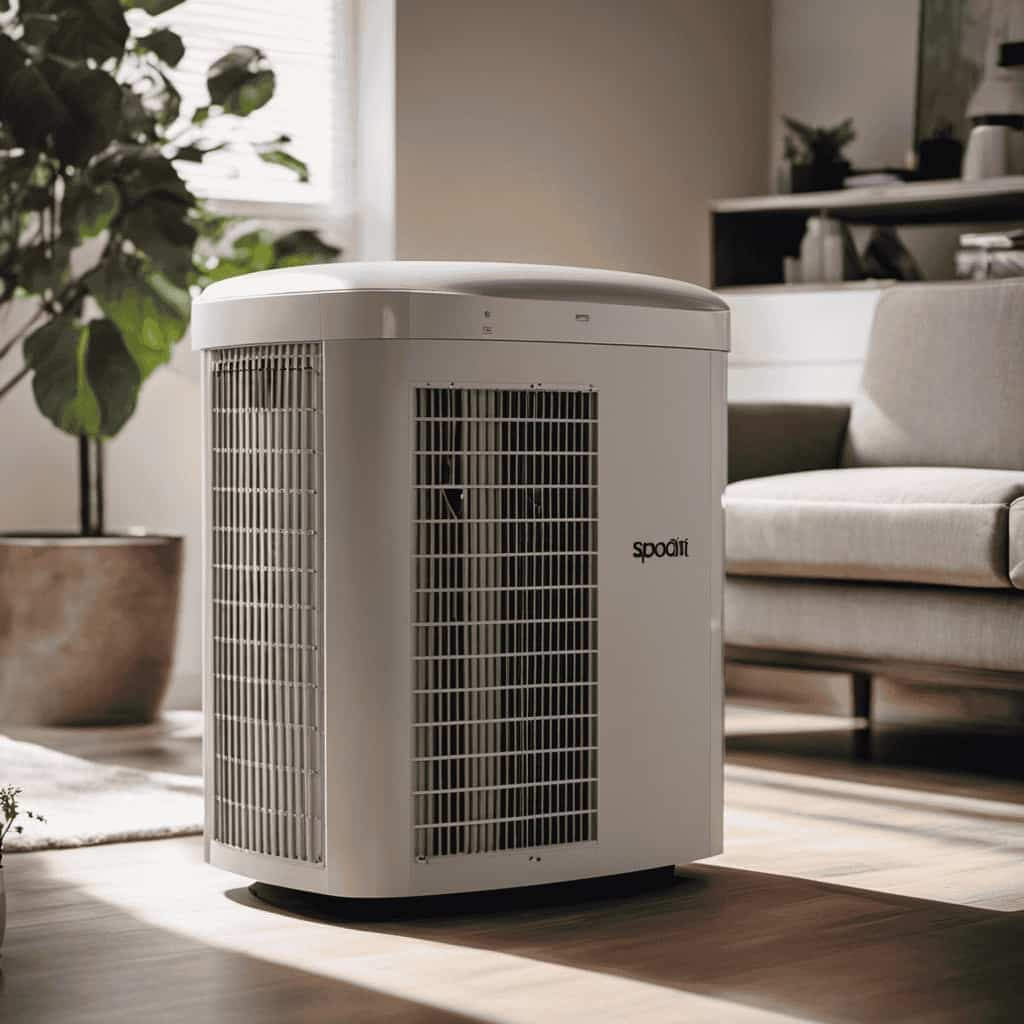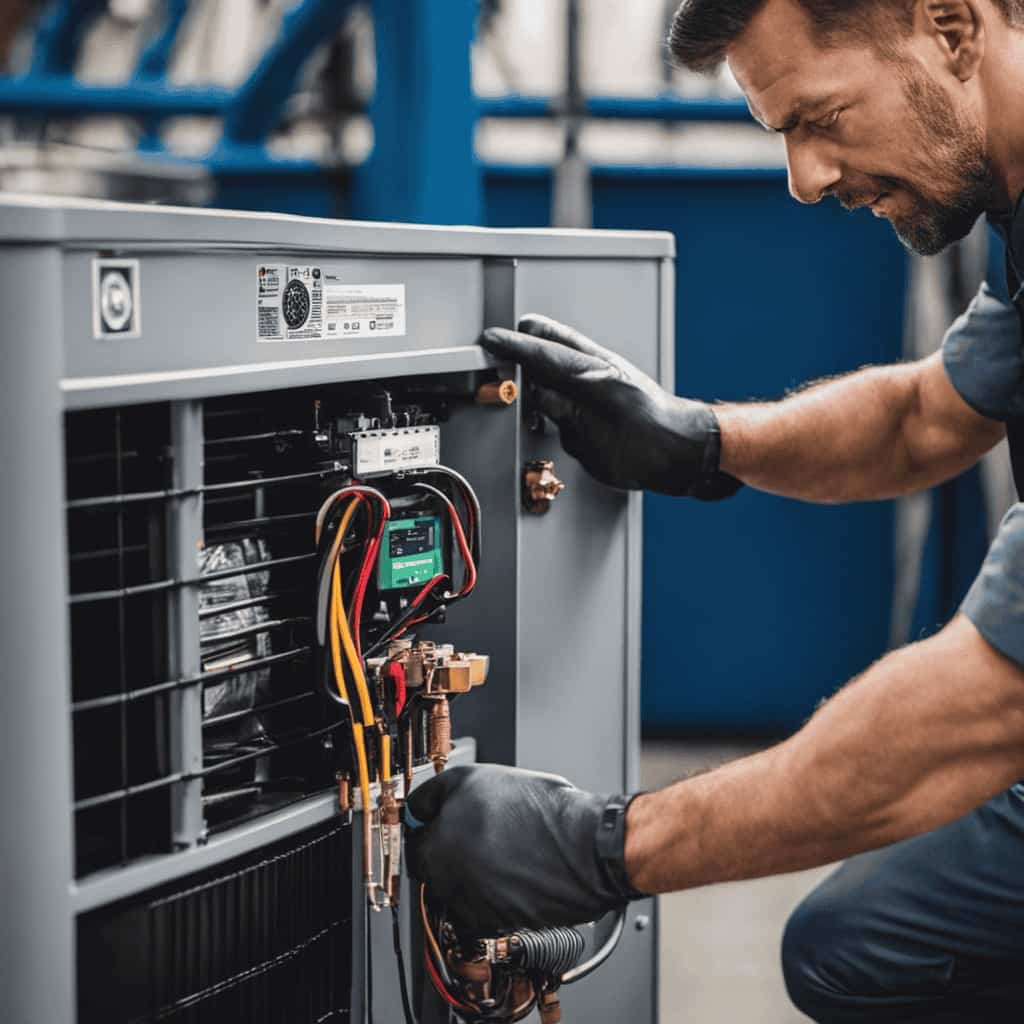
Welcome to our guide on energy-efficient heat pump systems! Our goal is to help you gain a better understanding of heat pump technology and make informed decisions for your home.
With our expert tips and advice, you’ll discover the many benefits of these systems and learn how to choose the right size and type for your needs.
From installation and maintenance to energy-saving strategies, we’ll show you how to maximize efficiency and savings.
Let’s embark on this journey together!
Key Takeaways
- Heat pumps are highly energy-efficient and use less electricity compared to traditional heating systems.
- Energy-efficient heat pump systems offer benefits such as lower energy costs, reduced environmental impact, and integration with smart home technology.
- When choosing a heat pump, consider factors such as heat pump efficiency, proper sizing for optimal performance, climate considerations, and the type of heat pump that best fits your needs.
- To maintain optimal efficiency, it is important to have regular system inspections, set efficient temperatures on the thermostat, and clean or replace filters regularly.
Understanding Heat Pump Technology
In this section, we’ll explain how heat pump technology works and its benefits for energy-efficient heating and cooling. Understanding heat pump efficiency and the advancements in heat pump technology is crucial for homeowners seeking efficient and cost-effective heating and cooling solutions.
Heat pumps work by transferring heat from one location to another, rather than generating heat like traditional heating systems. This makes them highly energy-efficient, as they use less electricity to move heat instead of creating it. By harnessing the natural heat in the air, ground, or water, heat pumps can provide both heating and cooling functions.
Advancements in heat pump technology have greatly improved their efficiency and performance. Modern heat pumps now come with variable-speed compressors, allowing for precise temperature control and reduced energy consumption. Additionally, smart thermostats and zoning systems optimize energy usage by adjusting settings based on occupancy and room requirements.
Benefits of Energy-Efficient Heat Pump Systems
We can enjoy several benefits with energy-efficient heat pump systems, such as lower energy costs and reduced environmental impact. Energy-efficient heat pump systems utilize advanced technology to maximize energy efficiency, resulting in significant savings on your utility bills.

These systems are designed to extract heat from the air or ground and transfer it into your home, providing both heating and cooling capabilities. By using less energy to maintain a comfortable indoor temperature, energy-efficient heat pumps help reduce your carbon footprint and minimize environmental impact.
Additionally, these systems can be integrated into smart home technology, allowing you to control and monitor your heating and cooling remotely. This level of convenience and control not only enhances your comfort but also promotes energy conservation and overall sustainability.
Choosing the Right Size and Type of Heat Pump for Your Home
To ensure optimal performance, it’s important to select the right size and type of heat pump for your home. Here are four key factors to consider when choosing a heat pump:
-
Heat pump efficiency: Look for a heat pump with a high Seasonal Energy Efficiency Ratio (SEER) and Heating Seasonal Performance Factor (HSPF). These ratings indicate the efficiency of the heat pump in both cooling and heating modes.

-
Heat pump sizing: Properly sizing your heat pump is crucial to its performance. An undersized heat pump will struggle to heat or cool your home effectively, while an oversized one may cycle on and off frequently, leading to energy wastage. Consult with a professional to determine the right size for your home.
-
Climate considerations: Consider the climate in your area when selecting a heat pump. Heat pumps have different efficiency ratings for different temperature ranges, so choose one that’s suitable for the climate you live in.
-
Type of heat pump: There are several types of heat pumps available, including air-source, water-source, and geothermal heat pumps. Each type has its own advantages and considerations, so research and choose the one that best fits your needs.
By taking these factors into account, you can select a heat pump that will efficiently and effectively heat and cool your home.
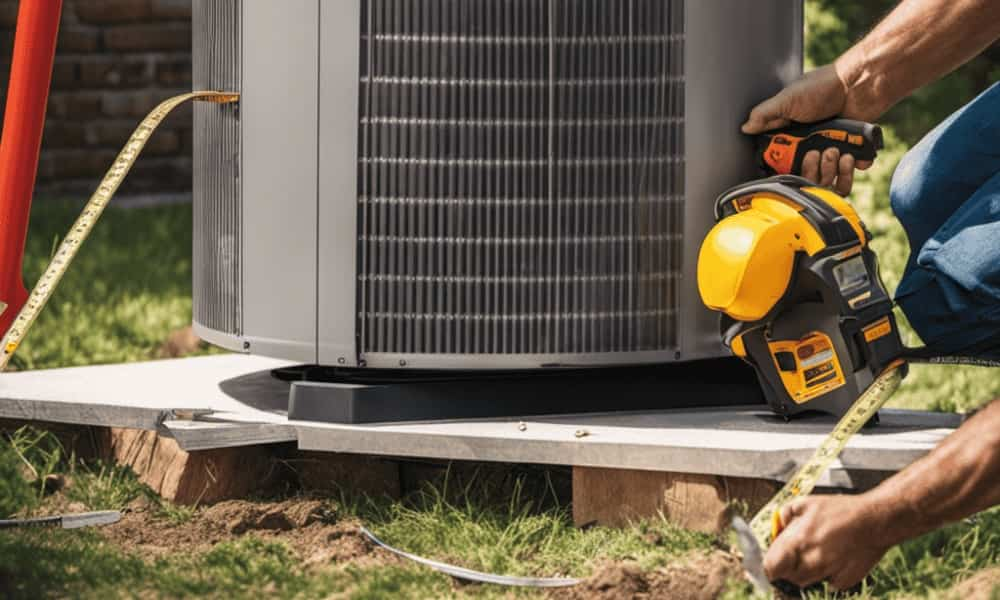
Now let’s move on to the next section, where we’ll discuss installation and maintenance tips for optimal efficiency.
Installation and Maintenance Tips for Optimal Efficiency
When it comes to maintaining optimal efficiency for your heat pump system, there are a few key points to keep in mind.
First, proper filter cleaning is essential to ensure unrestricted airflow and prevent strain on the system.
Second, regular system inspections by a professional can help identify any potential issues early on and ensure that all components are functioning properly.

Lastly, setting your thermostat to efficient temperatures can help minimize energy usage and maximize the system’s efficiency.
Proper Filter Cleaning
Regularly checking and replacing filters is essential for maintaining optimal efficiency in your heat pump system. Improper maintenance and common filter mistakes can lead to reduced performance and increased energy consumption. To ensure your filters are clean and functioning properly, follow these installation and maintenance tips:
-
Choose the right filter: Select a filter with the appropriate MERV rating for your system, as higher ratings can restrict airflow.
-
Regularly inspect and clean filters: Check your filters at least once a month and clean or replace them as needed.

-
Clean filters properly: If reusable, clean them according to the manufacturer’s instructions using mild detergent and water.
-
Maintain a regular filter replacement schedule: Set reminders to replace disposable filters every 1-3 months or as recommended by the manufacturer.
By properly cleaning and maintaining your filters, you can maximize the efficiency of your heat pump system.
Now, let’s move on to the next section about regular system inspections to ensure optimal performance.

Regular System Inspections
As we aim for optimal efficiency, it’s important that we regularly inspect our heat pump systems for installation and maintenance purposes. System maintenance plays a crucial role in ensuring our heat pump operates at peak performance and efficiency.
Regular professional inspections can help identify any potential issues and address them promptly, preventing costly repairs and ensuring uninterrupted comfort. During these inspections, professionals will thoroughly examine the entire system, including the electrical connections, refrigerant levels, coils, and controls. They’ll also clean and lubricate the necessary components and check for any signs of wear or damage.
Efficient Thermostat Settings
To achieve optimal efficiency, we need to set our thermostat to the most efficient settings and ensure proper installation and maintenance. Here are some energy saving tips and programming schedules to help you maximize efficiency:
-
Program your thermostat: Set different temperatures for when you’re home, asleep, or away. This helps reduce energy consumption when you don’t need as much heating or cooling.

-
Use setback temperatures: Lower the temperature during times when you don’t need as much heating, such as when you’re at work or sleeping. This can save energy and reduce your utility bills.
-
Avoid extreme temperature changes: Gradual adjustments to the thermostat are more efficient than sudden temperature changes. Give your heat pump time to adjust and maintain a consistent indoor temperature.
-
Regular maintenance: Clean or replace air filters regularly to allow for optimal airflow. Dust and debris can hinder performance and reduce efficiency.
Energy-Saving Strategies for Heat Pump Operation
We can optimize our heat pump’s energy efficiency by implementing smart strategies for its operation. Here are some energy-saving tips that can help us reduce energy consumption while still enjoying the benefits of a comfortable indoor environment.

First, it’s important to properly maintain our heat pump by regularly cleaning or replacing air filters. This improves airflow and allows the system to work more efficiently.
Additionally, we can set our thermostat to a moderate temperature and avoid frequent adjustments, as this can lead to unnecessary energy usage.
It’s also helpful to keep doors and windows closed to prevent heat loss or gain.
Lastly, using programmable thermostats allows us to schedule temperature changes based on our daily routines, maximizing comfort while minimizing energy consumption.

Maximizing Savings With Heat Pump Rebates and Incentives
By taking advantage of heat pump rebates and incentives, we can maximize our savings on energy-efficient systems.
Here are some key points to consider when it comes to heat pump rebates and incentives:
-
Research energy efficient heat pump manufacturers: Look for manufacturers that offer rebates or incentives for their products. These manufacturers often have a range of energy-efficient options that can help you save on your energy bills.
-
Understand the common misconceptions about heat pump rebates: Many people mistakenly believe that heat pump rebates are only available for new installations. However, there are often rebates and incentives available for upgrades and replacements as well.
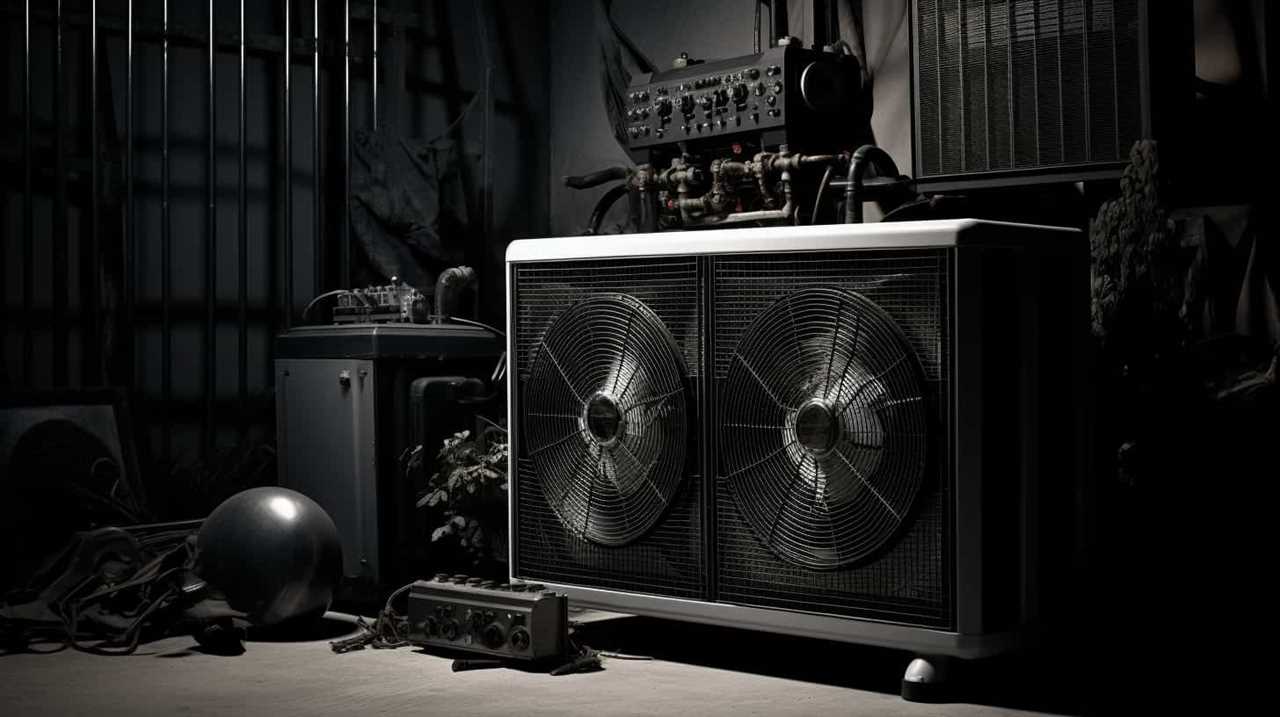
-
Check with your local utility company: Utility companies often offer rebates and incentives for energy-efficient appliances, including heat pumps. Contact your utility company to see if they have any programs available.
-
Take advantage of federal, state, and local programs: In addition to utility company incentives, there may be federal, state, or local programs that offer rebates for energy-efficient heat pump installations. Research these programs to maximize your savings.
Frequently Asked Questions
Are There Any Safety Precautions I Should Take When Operating a Heat Pump System?
When operating a heat pump system, it’s important to take safety precautions. Regular maintenance tasks, such as cleaning or replacing filters, can help ensure efficient and safe operation.
Can a Heat Pump Be Used as the Primary Heating and Cooling System for My Home?
Yes, a heat pump can be used as the primary heating and cooling system for your home. It offers high efficiency and numerous benefits, such as cost savings and environmental friendliness.
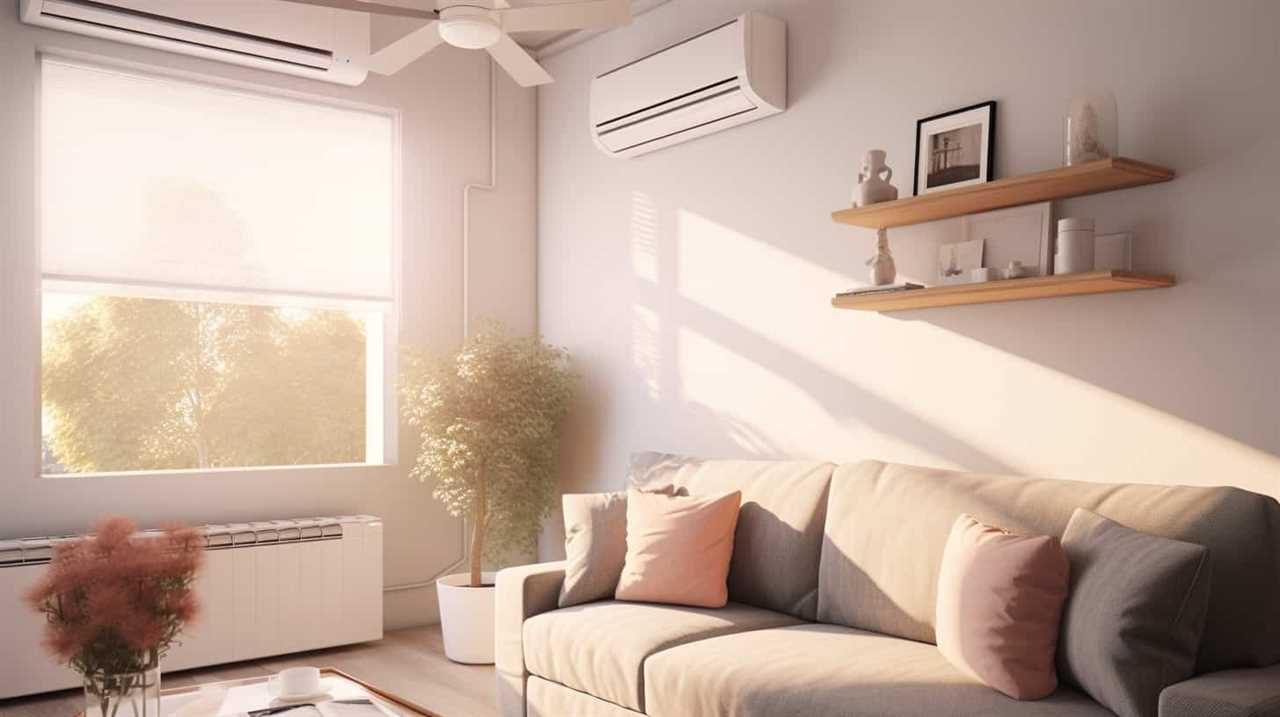
How Long Does the Installation Process Usually Take for a Heat Pump System?
On average, heat pump installation takes around 2-3 days. Our team of experts will efficiently install your system, ensuring a comfortable home in no time. Sit back and let us handle it!
Are There Any Specific Maintenance Tasks I Should Regularly Perform to Ensure Optimal Efficiency of My Heat Pump System?
Regular maintenance tasks are crucial for maintaining optimal heat pump efficiency. We recommend cleaning or replacing air filters regularly, inspecting and cleaning coils, and checking refrigerant levels. These tasks ensure peak performance and energy savings.
What Are Some Common Signs That Indicate My Heat Pump System May Need Repair or Servicing?
Common signs of heat pump system issues include inadequate heating or cooling, unusual noises, and frequent cycling. Regular maintenance is vital to ensure optimal efficiency and prevent costly repairs.
Conclusion
In conclusion, energy-efficient heat pump systems offer a cost-effective and environmentally-friendly solution for heating and cooling your home. With proper installation and maintenance, these systems can provide optimal efficiency and savings.
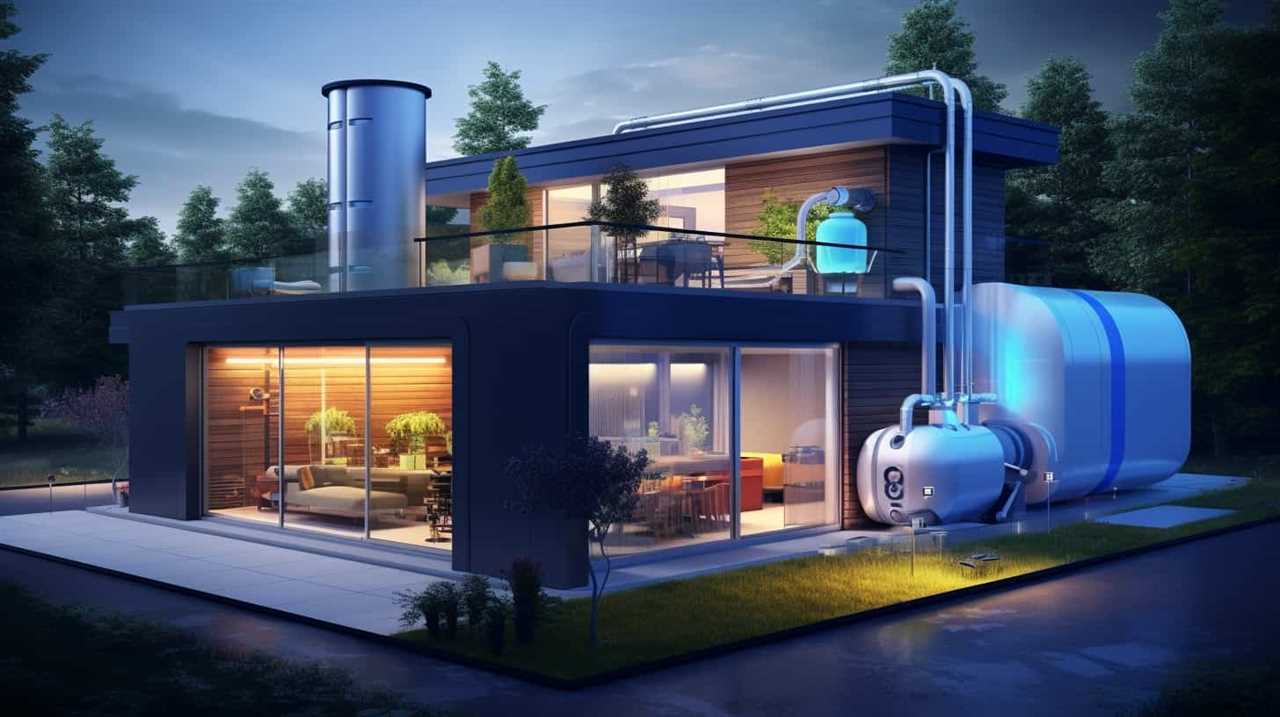
By choosing the right size and type of heat pump, implementing energy-saving strategies, and taking advantage of rebates and incentives, homeowners can maximize their savings while enjoying the comfort of their homes.
As the saying goes, "Investing in energy-efficient technology is like planting a seed that grows into a fruitful tree of savings."



